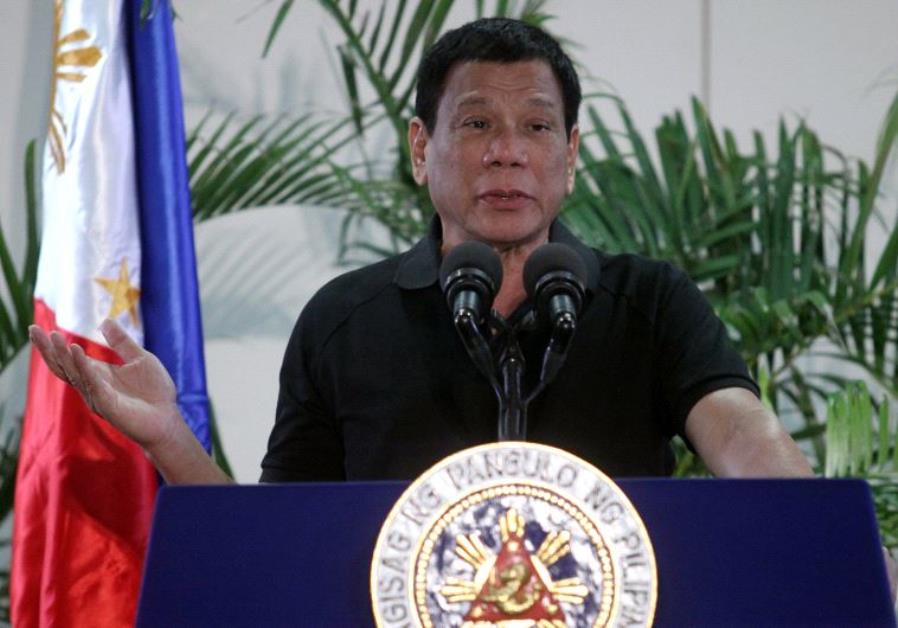Controversial Duterte to arrive for 1st ever visit by Filipino president

Philippines President Rodrigo Duterte. (photo credit: REUTERS)
The Philippines’ controversial President Rodrigo Duterte is scheduled to arrive Sunday for a four-day visit, on the heels of yet another statement that triggered fury in which he said during a speech Thursday that rape will continue as long as there are beautiful women.
Duterte – known primarily for these types of outrageous statements and for a brutal war against drug dealers, with allegations that his government has executed thousands of people in his war on narcotics – will be the first president of the Philippines to visit the country since ties were established in 1958.
In 2016 he likened his war against drugs to Hitler’s war against the Jews, though he later apologized for that remark.
Reflecting awareness that Duterte’s visit has sparked controversy in Israel and abroad, the Foreign Ministry took the unusual step Friday of issuing a lengthy statement that read like an explanation as to why Israel will be hosting him.
The statement began by saying Israel “welcomes the visit,” and then was quick to point out that after the visit here, he will continue on to Jordan.
According to the statement, Duterte timed his visit to mark several important events, including the 80-year anniversary of the Philippines opening its gates and providing sanctuary to Jewish refugees fleeing the Nazis; the 70-year anniversary of the Philippines’ support for the 1947 UN Partition Plan, the only Southeast Asian state to do so; and the 60-year anniversary of the establishment of diplomatic relations between the two countries.
“We assign great importance to this visit, which symbolizes the strong, warm ties between our two peoples as well as the enormous potential for developing and strengthening the relations,” the statement read.
(function(w,d,s,i){w.ldAdInit=w.ldAdInit||[];w.ldAdInit.push({slot:10834723912266086,size:[0, 0],id:”ld-9628-9059″});if(!d.getElementById(i)){var j=d.createElement(s),p=d.getElementsByTagName(s)[0];j.async=true;j.src=”//cdn2.lockerdomecdn.com/_js/ajs.js”;j.id=i;p.parentNode.insertBefore(j,p);}})(window,document,”script”,”ld-ajs”);
“Cooperation between the two countries is thriving. In diplomacy, it is expressed in public statements by the leadership in Manila as well as in issues important to Israel in the international arena,” it continued.
For example, the Philippines has abstained in a number of Israel-related votes at the UN.
“Other areas of robust cooperation are security and combating terrorism, tourism, investments, energy, infrastructures, and more,” the statement read, with all of those issues on the agenda during Duterte’s visit.
Duterte is arriving with a massive delegation, including a number of ministers – including his defense minister – and retiring police and army officials. In 2017 the Philippines emerged for the first time as a major arms market for Israel, buying radar and anti-tank systems at a cost of some $21 million.
Anther issues on the agenda is the opening of a direct flight route from Manila to Tel Aviv, and the possibility that – like a recently inaugurated Air India flight from New Delhi – such a flight may fly over Saudi Arabia on its way to and from Israel. Such a route would increase tourism for both countries, including Philippine Christians wanting to make a pilgrimage to the Holy Land.
Also among the agreements to be signed, according to the Foreign Ministry, is an agreement to regulate the employment of an estimated 28,000 Filipino care-workers in Israel. According to the Foreign Ministry, this “agreement will protect the workers’ rights, ensure equal and fair treatment of them, and cancel all the fees that until now they have been forced to pay to intermediate agents.”
Another agreement will be signed to bring Filipinos to work in Israel hotels.
In addition to his defense minister, Duterte will also be accompanied by his ministers of foreign affairs, trade and industry, agriculture, internal security, science and technology, labor and employment, tourism and transportation. Senior senators will also be part of the delegation, as will some 150 businessmen.
He is scheduled to arrive Sunday evening and shortly afterward hold an event for Filipino workers in Jerusalem. During his visit he is scheduled to meet Prime Minister Benjamin Netanyahu and President Reuven Rivlin, tour the Old City, visit Yad Vashem and inaugurate a monument in Rishon Lezion that commemorates the Philippines rescue of Jews during World War II.
Some 1,300 Jews found refuge in the Philippines during the Holocaust, fleeing there from Austria and Germany from 1937 to 1941, only to then find themselves under Japanese occupation. Two of those survivors who found refuge in the Philippines will be on hand at the Rishon Lezion event.
Another issue likely to be raised during the visit is the possibility of the Philippines – a historically strong US ally – moving its embassy to Jerusalem.
The Philippines was mentioned repeatedly in December as one of a handful of countries that may follow the US lead and move its embassy to Jerusalem, a rumor shot down by Foreign Secretary Alan Peter Cayetano later that month when he said the move had not been discussed. Nevertheless, reports about a possible move have continued to surface.
The Philippines, which has a large Evangelical community, was one of 35 countries which abstained when the UN General Assembly passed a resolution in December that condemned the US for the move.
Join Jerusalem Post Premium Plus now for just $5 and upgrade your experience with an ads-free website and exclusive content. Click here>>






Comments are closed.